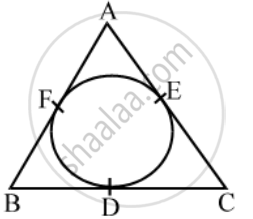Advertisements
Advertisements
Question
In the given figure, the incircle of ∆ABC touches the sides BC, CA and AB at D, E, F respectively. Prove that AF + BD + CE = AE + CD + BF = `\frac { 1 }{ 2 } ("perimeter of ∆ABC")`
Sum
Solution
We know that the lengths of tangents from an exterior point to a circle are equal.

∴ AF = AE …. (i) [tangents from A]
BD = BF ….. (ii) [tangents from B]
CE =CD …. (iii) [tangents from C]
Adding (i), (ii) and (iii), we get
(AF + BD + CE) = (AE + BF + CD) = k (say)
Perimeter of ∆ABC = (AF + BD +CE) + (AE + BF + CD)
= (k + k) = 2k
`∴ k = \frac { 1 }{ 2 } "(perimeter of ∆ABC)"`
Hence AF + BD + CE = AE + CD + BF = `\frac { 1 }{ 2 } ("perimeter of ∆ABC")`
shaalaa.com
Is there an error in this question or solution?
